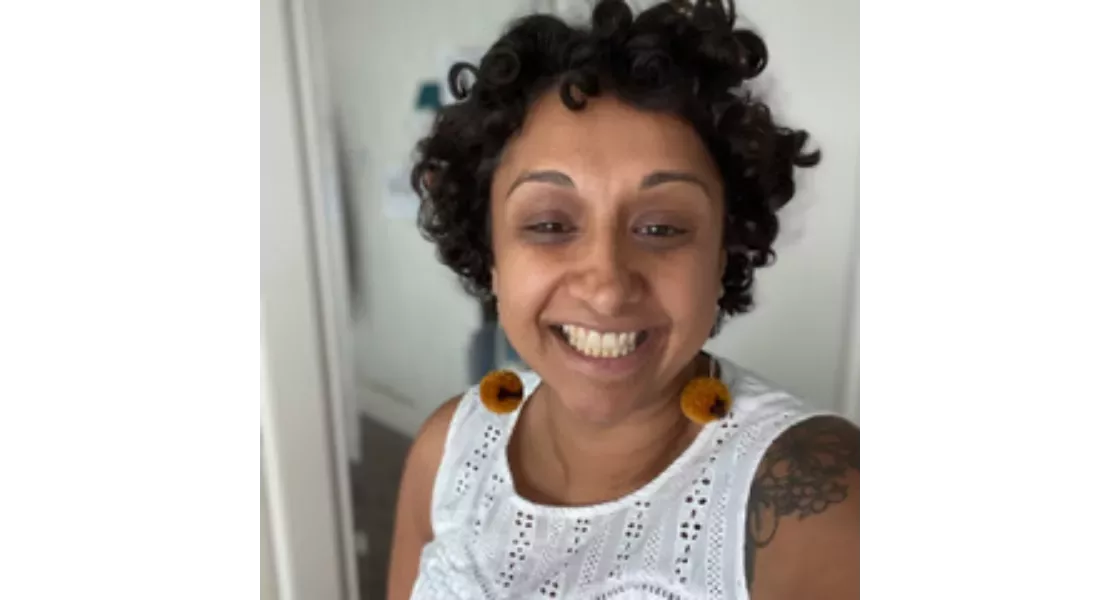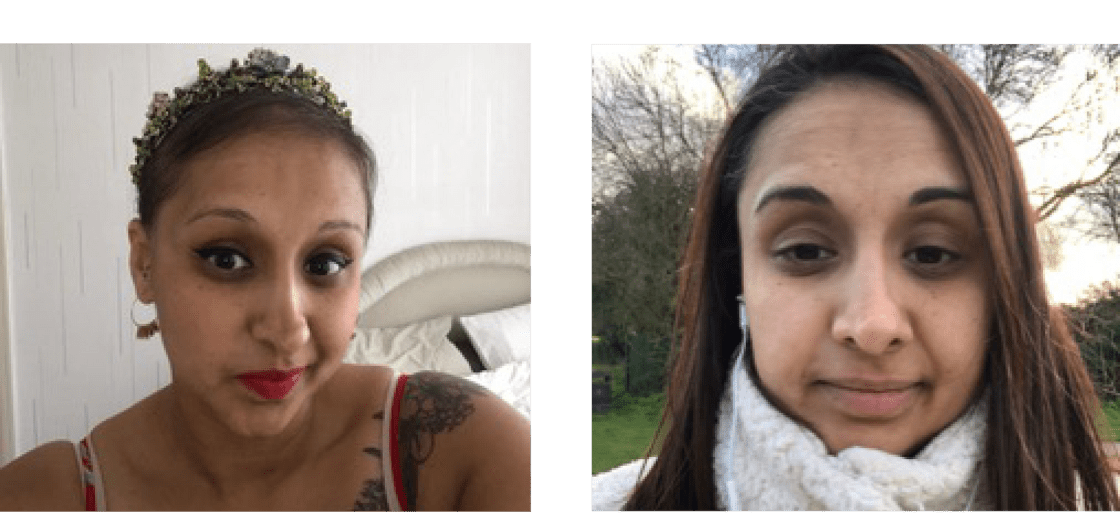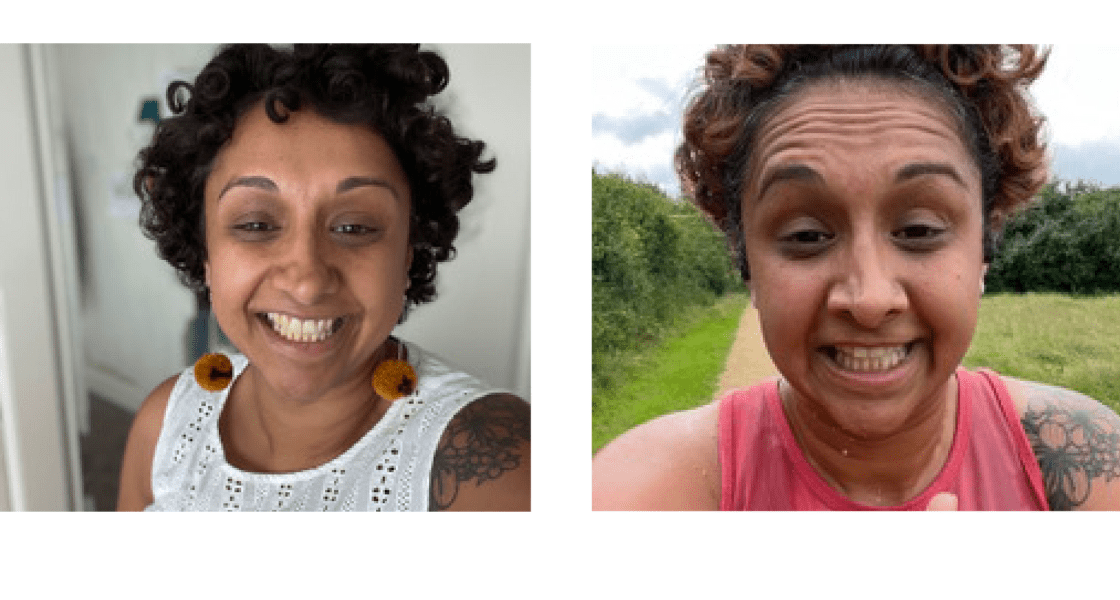
After discovering a painful lump in her breast, Sukhy was diagnosed with breast cancer when she was 35. Sukhy spoke to us about why she would always recommend getting something checked out and how her experience has changed her relationship with her body and mental health.
Hi Sukhy, could you tell us a little bit about your diagnosis?
I was diagnosed aged 35, just before the pandemic in December 2019. I was then re-diagnosed in February 2020, when we realised it had spread. I had found a painful lump in my right breast whilst I was on my period which didn’t disappear when I was lying down. I had never really self checked before and I never thought breast cancer was anything that could affect me. I’m guessing the lump had been there for a while as it felt like it had grown between me finding it and getting it checked out. I felt really fatigued all the time, but I am the mum of two small children, had recently split from my husband, and had started a university course, so just pinned the fatigue down to stress and being busy. I didn’t feel great, but I thought it could be any one of these factors.
What did you do after you found the lump?
I had found a lump in 2018 in my left breast around the nipple area and had it checked out at the time. I had an ultrasound and it was clear so I assumed that the lump in my right breast would be the same thing which is the reason why I put off getting it checked at first. I spoke to my partner about the lump and he felt it too, but we both thought it was nothing. I called the GP and saw someone almost immediately. My doctor was brilliant and referred me quickly – the hospital contacted me within two weeks for a check. They first carried out an ultrasound and then did a biopsy as they were a little more concerned.
When I went to my follow-up appointment the nurse said, “Oh, you’ve come alone” and I knew that it was going to be really bad news. After they used the word ‘cancer’ I zoned out and didn’t really take in any of the information they had told me. I was given a whole load of leaflets and was told that it would be sorted out. I told my partner of the time, my family and my best friends.

Did you know anything about breast cancer before you were diagnosed?
I assumed breast cancer was an ‘old person’s disease’ and never thought it could happen in your 30s. I have no family history of breast cancer and had breastfed my two children which I was told would reduce my risk of breast cancer. I was so young and quite healthy at the time I was diagnosed so I was really shocked.
How did your friends and family cope with your diagnosis?
I have two sisters but I’m the youngest in my family. It was horrible for my Mum and Dad to have a child diagnosed. My mum is now petrified of me getting ill again and my dad doesn’t talk about it all. If he does, he gets very emotional and shuts off. My sisters couldn’t physically do anything whilst I was having my treatment: one sister works in a school so was deemed high risk during the pandemic, and my other sister lives in another country.
How did you find having treatment during Covid-19?
All of my sessions and appointments were on my own. There was a point where my treatment was really hard and my nurse wanted to hug me, but due to the pandemic she couldn’t. It’s hard not to have the physical hugs that you really need at times like that. You need that human interaction. I had my mastectomy prior to the pandemic and all my following treatment throughout. Luckily, I had no delays to my treatment but it was terrifying and added extra pressure. You would hear stories of people dying from Covid-19, and it was very frightening knowing that my immune system was weaker due to the chemotherapy. My treatment finished in September 2020 and I’m now on hormone therapy.

Do you feel like this experience has impacted you in other ways?
Life has most definitely changed after being diagnosed with breast cancer. I no longer worry about the small things that used to stress me out, I try to enjoy everyday and make the most of my time. I’m also trying my best to keep active – this not only helps to calm any anxiety I might have, but it reminds me how truly amazing and resilient our bodies are.
The only thing I would change is to have someone to help me with my mental health before going through my treatments. I was prepared for the physical side of things but nothing prepared me for how to deal with the depression and anxiety that I associated with my diagnosis. For anyone who is about to go through treatment, I would encourage them to take it day by day and to remember that, although it may seem difficult at the time, it will pass and there is life after treatment. Be easy on yourself. I put a lot of pressure on myself to do things and I used up a lot of energy on other people, but it’s okay to be selfish – you need that time for yourself.
You mentioned exercise reminds you of your body’s resilience, do you feel like this experience has changed your relationship with your body at all?
I was never a big fan of my body. I’ve always considered myself a ‘big girl’ because I don’t fit into society and cultural norms of how a woman should look. I am covered in post-surgery scars and my hormone therapy has made me put on weight. Add into it a mass of chemo curls and I am so far from my old self it’s crazy.
However, I have recently come to the realisation that it doesn’t matter. I am amazed at the strength my body possesses and how resilient it actually is. The chemo curls are a reminder that I’m no longer sick; the longer they grow the longer I am alive – it’s amazing!
I started the Couch to 5k when I was on chemotherapy to try and build up my strength and, before my most recent operation, I completed my fastest 5k ever, in under 30 minutes! I was the fittest I have ever been in my adult life. It’s definitely given me a bigger appreciation of my body. People suggested meditation but it didn’t work for me – I find running and yoga are the things that help my mind and calm me down.
Unfortunately, I haven’t been able to run since my last operation in mid-July, as it’s important to allow my body to heal and recover, but I cannot wait to get back to my running
Do you have any advice for someone who might have also found something unusual for them?
My advice would be always, always, always get it checked out. The best outcome a doctor can give you is that it’s nothing. If you do find something, then the sooner you get it checked out the better. I am a massive advocate for mental health – we often chug along through treatment and then at the end when it’s finishing, everyone freaks out. You feel like you are being looked after during the treatment, there are people there. When that ends, it’s hard for the brain to deal with. I would suggest having your therapy there, during and after treatment, if you need it and know what your resources are. My team were absolutely brilliant in helping me and I’m so grateful.